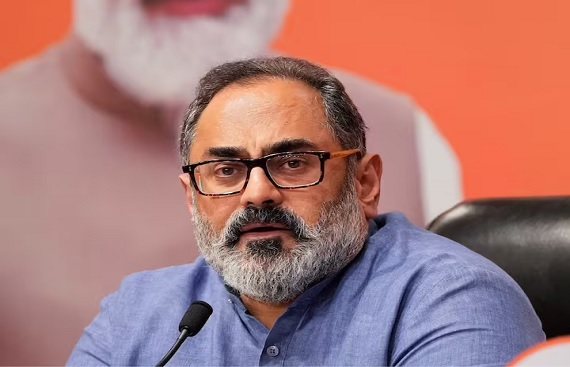Rajeev Chandrasekhar advocates India's digital-first strategy with focus on R&D and AI use
By
siliconindia | Wednesday, 07 February 2024, 03:07 Hrs

Rajeev Chandrasekhar, the Minister of State (MoS) for Electronics and IT, highlighted India's transformation from being perceived as merely the "back-office" of the IT industry to becoming an innovative economy that significantly shapes the digital landscape. This was during his address on the technological advancements in India during the past decade at the DNPA Conclave and Awards 2024. "In the last 10 years technology growth in India has been spectacular. We have gone from being the "back-office" of the IT space to an innovation economy that spans the digital ecosystem. Whether you look at artificial intelligence (AI), semiconductors, or web3 Indian flag, start-ups and innovation are there if you look to the future", he said.
Chandrasekhar emphasized that India and its skilled workforce are now recognized beyond their traditional roles as merely cost-effective solutions or back-office centers. Instead, they are increasingly seen as essential collaborators in shaping the future of technology. This shift marks a significant evolution in the dynamic landscape of the global tech industry. "India's policy is enabling and that is the qualitative structural change that has created the momentum seen today. We have to make our talent pool global standard esp in areas such as semiconductors and AI you need the ability to research and innovate", he said.
A key factor in India's tech progress is its supportive policy framework. Policy changes have fostered an environment for growth and innovation, driving momentum in the tech sector. However, a significant challenge remains in elevating India's talent pool to global standards, particularly in areas like semiconductors and AI. Emphasizing research and innovation is crucial for India to compete globally. "It is no longer sufficient to be just an engineer or to have a master's or even just a few years of experience; you really need the ability to research and innovate. Research and innovation should be embedded in your colleges, universities, and workplaces", he added.
Addressing this challenge is crucial for maintaining India's growth and influence in the constantly changing tech arena. Chandrasekhar reiterated the Narendra Modi government's dedication to fostering digital innovation and ensuring the ongoing evolution in the sector. He highlighted the government's commitment to nurturing and protecting this progress. Chandrasekhar emphasized that the allocation of a $12 billion seed fund for research and innovation in the budget underscores the government's determination to harness the potential of India's youth. The minister underscored the importance of integrating research and innovation into educational institutions and workplaces.
Chandrashekhar highlighted India's proactive approach to addressing emerging tech challenges, such as fake news and deepfakes, before they gained global attention. Additionally, amidst worries regarding AI's impact on employment, the minister encouraged an optimistic perspective, asserting, "We need not dread technology; AI will revolutionize our lifestyles." He emphasized the importance of governmental supervision and regulatory structures to manage this shift responsibly. Expressing concerns about advertising technology monopolies, Chandrasekhar remarked, "We're apprehensive about ad tech monopolies", emphasizing the necessity to tackle possible monopolistic behaviors within the ad tech sector.
Responding to questions about the legal dispute between the New York Times and OpenAI, he felt the case would "define the use of AI in content creation" and underscored the significance of accountability and transparency in AI-driven processes. Addressing regulatory challenges, Chandrasekhar said, "Nobody can put a publicly available platform on trial. We take the safety of our digital Nagriks very seriously".
